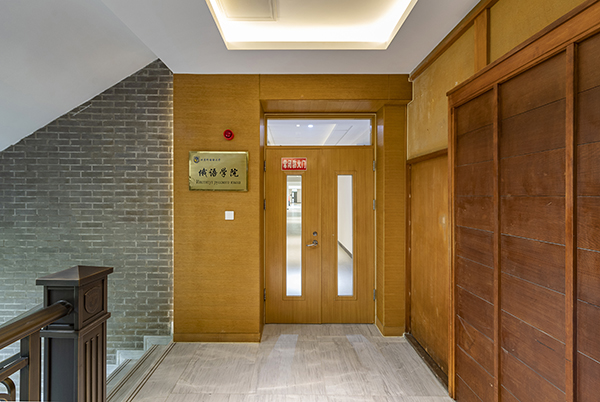- Research
- Research Centers
- Journals
- Admission
- Introduction
- Programs
- Application
- Alumni & Giving
- Alumni Club
- Giving

The School of Russian Studies is the oldest academic unit at Beijing Foreign Studies University (BFSU). Its history dates back to 1941 when the Russian Language Team was established under the Third Branch of Chinese People's Anti-Japanese Military-Political University. In 1949, the team evolved into the Beijing Russian Language Training School, and it was renamed Beijing Russian Language Institute in 1955. In 1959, the institute merged with Beijing Foreign Languages Institute to form the new Beijing Foreign Languages Institute, which included the Department of Russian Studies. In 1994, Beijing Foreign Languages Institute was renamed Beijing Foreign Studies University, and the Department of Russian was renamed the School of Russian Studies in the same year.
Currently, the school offers programs at three levels: undergraduate, master's, and doctoral, along with a postdoctoral research station. The major of Russian Language and Literature became one of the first master's degree-granting programs in China in 1981, obtained doctoral degree-granting authority in 1986, and the school established a postdoctoral station for the major in 1996. In 2002, the major was designated as a key discipline of Beijing, and in 2007, as part of BFSU's Linguistics and Applied Linguistics, it became a national key discipline. The Russian major and Ukrainian (Russian) major were recognized as national First-Class Undergraduate Programs in 2019 and 2022, respectively.
As of June 6, 2025, the school has 26 professional teachers, including seven professors, four of whom are doctoral supervisors, eight associate professors, 10 lecturers, and one teaching assistant. Among the teachers, 96 percent hold doctoral degrees, and all of them have overseas study experience. The faculty leads China's Russian education in teaching research, practice, and textbook compilation, having won the national outstanding textbook award, national and municipal-level awards for outstanding teaching achievements, as well as titles like Beijing's Outstanding Undergraduate Education Team and Beijing's Master Teachers. The school has also developed many quality courses including the national first-class undergraduate courses, and has received major awards in domestic and international teaching competitions.
To meet the nation's strategic needs, the school took the lead in China to establish the Russian Society and Culture Research Program in 2002 and the Shanghai Cooperation Organization University Regional Studies in 2011, thereby expanding the scope of Russian studies to include Russian linguistics, Russian literature, Russian-Chinese translation and research on Eastern Slavic and Central Asian countries and regions.
In response to the country's Belt and Road Initiative, the school has developed non-commonly-taught language programs. Building on its traditional strengths in Russian education, it has adopted a "Russian language plus" model to cultivate multilingual and interdisciplinary talents, enrolling undergraduates in majors of Ukrainian (2003, 2016, 2019, 2023), Kazakh (2016, 2020), Uzbek (2017, 2020), Tajik (2017, 2021), Kyrgyz (2018, 2022), Turkmen (2018, 2024), and Belarusian (2019, 2025). Additionally, it enrolled undergraduates in the interdisciplinary major "Russian Language plus Finance" in 2019 and 2020. In 2025, the "Russian Language plus Big Data Management and Application" dual-bachelor's degree program achieved its first enrollment, creating a new talent cultivation framework centering on Russian education and characterized by multilingual studies, regional research, and AI integration.
Adhering to the educational principles of "language proficiency, distinct disciplines, academic excellence and global perspectives", the school aims to cultivate world-class, versatile Russian professionals with "patriotism, a global vision, and professional expertise" for the digital era. The school maintains a high level of internationalization, partnering with over 20 famous universities in Russia, Belarus, Ukraine and the five Central Asian countries, and also serves as a member of the SCO University Regional Studies program. Senior undergraduates and graduate students can study abroad through government-sponsored or university exchange programs.
The school's graduates are known for their solid professional foundation, broad knowledge, strong cross-cultural perception, communication skills and international competence. They excel in diplomacy, foreign affairs, trade, finance, culture, education, journalism, technology and business, receiving a positive response from employers.
The school places great emphasis on academic research, providing a platform for Russian teaching and academic research nationwide. In 1959, it founded the journal Russian Language Learning and now publishes academic journals Chinese Russian Language Teaching, Eurasian Humanities Research and Chinese Slavic Studies (foreign language edition). There are several major research institutes in the school, including the Secretariat of the China-Belarus Humanities Exchange Center, which is a major intergovernmental project, and three institutes registered with the Ministry of Education — the Russian Studies Center, the Ukrainian Studies Center, and the Kazakh Studies Center. Additionally, it collaborates with overseas partners to establish the Russian language Center, Ukrainian Center, Belarusian Center, China-Belarus Humanities Exchange Center, and Kazakh Center, providing high-quality platforms for international exchange and regional studies.
Now the school serves as the deputy director of the Russian language teaching guidance sub-committee under the Ministry of Education's college foreign language and literature teaching guidance committee, the vice-president of the Association of Chinese Teachers of Russian Language and Literature, and the director of the test teams of Test for Russian Majors Grade Four and Grade Eight. The school has always been in a leading position in the field of Russian language studies in China.